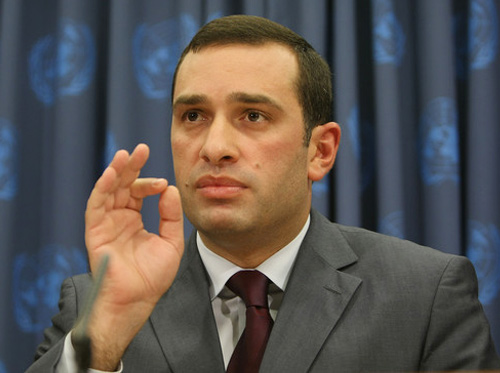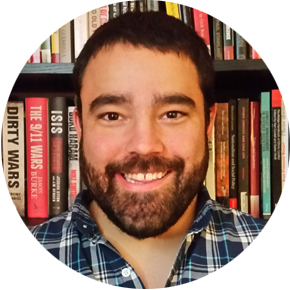Exclusive interview of Georgian “Free Democrats” party leader Irakli Alasania to Mediamax
Irakli Alasania became the first Deputy Minister of State Security of Georgia in 2002. In 2004 he became the Deputy Minister of Defense and Deputy Secretary of National Security Council. In September 2004 Irakli Alasania became Chairman of the government-in-exile of Abkhazia and was appointed President’s special envoy for Georgian-Abkhazian talks. In 2006 Irakli Alasania was appointed Georgia’s permanent representative in the United Nations and resigned from that position in December 2008. In July 2009 he launched the “Free Democrats” oppositional party.
Mediamax Director Ara Tadevosyan talked to Irakli Alasania during the Brussels Forum, organized by the German Marshall Fund of the U.S.
- What is your assessment of the current state of Georgian-Armenian relations?
- Armenia is not only a good neighbor, but historically was a strategic partner of Georgia. Today’s relationship is on a very high level and the improvement of the relations during the past years in economy, tourism and other fields has been substantial. Despite the fact that I am in opposition to the current Georgian government, this is one of the few issues that we are on the same page. We want to see our relationship with Armenia deepening more, getting stronger. We understand that this relationship is important not only bilaterally, but it is also important for the common region. We want to see Armenia more involved in the regional energy, infrastructure building projects and we understand that future lies only in deepening of cooperation.
Georgian Armenians are one of the biggest societies in Georgia and we cherish this relationship. But I would like to see the Georgian government and politicians doing more for Armenians living in Tbilisi and Samtskhe-Javakheti for them to feel themselves to a greater extent involved in the process of building Georgia. I think the first steps were made by improving the infrastructure, in particular, repairing the roads. But much still needs to be done. As we are gearing up for the next parliamentary elections and later for Presidential elections, I would like to see more Armenian politicians emerging in the country and this would only benefit Georgia.
- Some people claim that elites in Georgia are suspicious regarding Armenia because of its strong ties with Russia and elites in Armenia are suspicious towards Georgia because of its close relations with Azerbaijan.
- Such phobias and suspicions are not grounded. Even during the very tough period that we had during the August 2008 war with Russia, our relationship with Armenia was excellent and our brothers in Armenia understood what we were going through. And we had the Armenian support for the Georgian territorial integrity which was very sensitive at that time.
- The issue of the conflicts is another factor that influences Georgian-Armenian relations. For obvious reasons Armenia supports the principle of the self-determination and Georgia puts on the forefront the territorial integrity principle.
- I think that ruling elites in Tbilisi and Yerevan understand that we should be very careful about those issues not giving any kind of grounds for the third countries to use our positions against each other. We are blessed that we are enjoying a strategic partnership with Armenia as well as with Azerbaijan. We understand that negotiations between Armenia and Azerbaijan are very difficult and Georgia stands ready to play a conciliatory role whenever it is needed. But this could happen only if Armenians and Azeris find it appropriate.
- What do you think about the attempts to normalize Turkish-Armenian relations?
- It is true that we enjoy a strategic relationship with Turkey in the fields of economy, security and military affairs. We would be only glad to see the signs of reconciliation between Armenia and Turkey. I made a special statement when the Turkish-Armenian process started and I supported it as a very important development for the whole region. It is very important to understand that without helping each other the region will not develop. I very much hope that the process will continue and it will lead to concrete results.
- What is the internal political situation in Georgia today? There was a time when the opposition was very active and demanding the resignation of the authorities. Today the situation seems to be calmer.
- I am very optimistic about the future elections. Now we are negotiating with the government for better conditions and the environment for the elections. International community is supporting this process and we hope to agree in a few months on the rules of the game. That will give us a chance to compete at the elections in a fairly. I am optimistic about the chances of my party as in the existing electoral environment my party got 20 % of the votes at the local elections in Tbilisi, which means that we have a solid base. 8 major oppositional parties of Georgia with different ideologies and electorates are acting together today pursuing changes in the electoral environment.
- So there is a dialogue between Georgian opposition and the government about fixing the rules of the game.
- Yes, and it is good. It is not easy, we are going through many troubles during the negotiations, but the government and opposition understand that now there is a chance for Georgia to demonstrate to itself and to the international community that we can change things through democratic institutions and procedures.



























